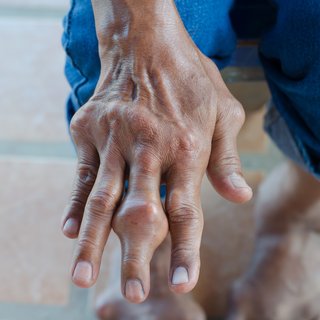Gout is a type of arthritis that causes sudden severe joint pain.
Symptoms of gout
The main symptoms of gout are:
- sudden severe pain in any joint - usually your big toe, fingers, wrists, elbows or knees
- red, hot, swollen skin over the affected joint
Non-urgent advice: Contact your GP if:
- you have symptoms of gout for the first time
- you have gout and your usual treatments are not helping
An attack of gout usually lasts 1 to 2 weeks if left untreated. If you do not get treatment, future attacks may last longer. Leaving gout untreated may cause lasting damage to joints.
Urgent advice: Contact your GP urgently if:
- the pain is getting much worse
- you have a very high temperature
- you feel sick
This could mean you have an infection inside the joint.
Check if it's gout
Gout can be hard to diagnose as symptoms are similar to other conditions.
Your GP may ask about your diet and if you drink alcohol. They may arrange further tests such as a blood test, ultrasound or x-ray.
Your GP will take a blood test to confirm it's gout. This test checks the sample for high levels of uric acid.
Sometimes, a specially trained doctor will take a sample of fluid from the affected joint, using a thin needle. The sample will then be checked for high levels of uric acid. Your GP does not always do this test.
How uric acid can affect a joint
Uric acid is a chemical. It can build up in your body. This can lead to crystals forming around your joints. This is what causes gout pain.
Causes of gout
Gout sometimes runs in families. It's more common in men, especially as they get older.
You may also be more at risk if you:
- have gone through menopause
- take some medicines, such as diuretics
- eat foods that cause a build-up of uric acid, such as red meat and seafood
- have high levels of cholesterol
- are carrying extra weight
- drink alcohol, especially beer
How diet and nutrition helps your health
Treatment to reduce pain and swelling
You can usually treat gout with anti-inflammatory medicine such as ibuprofen.
If the pain does not ease after 3 to 4 days, your GP might prescribe steroid tablets or an injection.
There are things you can do to help ease symptoms.
Do
-
take any medicine you've been prescribed as soon as you can - it should start to work within 3 days
-
rest and raise the sore limb
-
place an ice pack (or bag of frozen peas) wrapped in a towel on the sore joint, for up to 20 minutes at a time
-
drink lots of water, unless your GP tells you not to
-
try to keep bedclothes off the sore joint at night
-
protect the joint against accidental knocks
-
keep pressure off the joint
Prevent gout attacks
Gout can come back every few months or years or more often if not treated.
Your GP might prescribe medicine if you have:
- frequent gout attacks
- a high level of uric acid in your blood
The medicine aims to lower your level of uric acid. You may need to take it for a long time.
Take the medicine regularly, even when you no longer have symptoms.
Things you can do to stop gout coming back
Making lifestyle changes might stop or reduce further attacks.
Do
-
get to a healthy weight, but avoid crash diets or high-protein or low-carbohydrate diets
-
have a healthy diet
-
have at least 2 alcohol-free days a week and stick to the weekly low risk alcohol guidelines
-
drink up to 2 litres of water a day
-
exercise regularly - but avoid intense exercise or putting a lot of pressure on your joints
-
stop smoking - you can get help to quit
-
ask your GP about vitamin C supplements
Try to eat foods that are low in uric acid and saturated fat. There are some foods you should limit or avoid.
Do not eat:
- a lot of red meat, kidneys, liver or seafood
- sugary snacks and drink sugary drinks
- full-fat dairy products
- more than 2 servings of low-fat dairy foods a day
- a lot of fatty foods
Improve your health by drinking less alcohol
Things that can trigger a gout attack
You might get a gout attack if you're very stressed or have had an illness.
You may also feel symptoms of a gout attack coming on after a minor bump or injury to a joint.
Talk to your GP immediately if you feel you are about to have a gout attack.
Complications of gout
It's rare to get lots of gout attacks. But if you get a lot of attacks over a long time (chronic gout), it can cause permanent damage to the joint.
Chronic gout can also cause tiny white lumps (tophi) to appear under your skin, especially on your ears, fingers or elbows. These are small collections of urate crystals. They can be painful.

You can get kidney stones if your uric acid levels are very high. You will need medicine to reduce the levels.
Content supplied by the NHS and adapted for Ireland by the HSE
